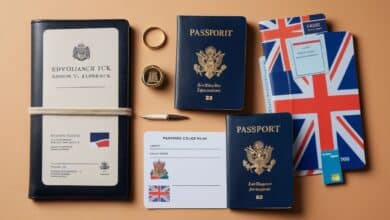Marriage Visa and Visa Sponsorship in Greece: Your 2025 Guide
Planning a life in Greece with a partner?
This guide outlines legal pathways for couples navigating residency through marriage or sponsorship. Whether you’re marrying a Greek citizen or seeking long-term stays, understanding the latest rules ensures smoother transitions.
Non-EU nationals often choose civil ceremonies due to their simplicity. U.S. citizens, for example, don’t need prior residency to marry locally. However, all foreigners must present an entry stamp from Greek or Schengen border authorities. This proves arrival dates and locations legally.
Residency permits become essential for stays beyond 90 days. Couples should prepare paperwork early—processing often takes weeks. Required documents vary based on whether applicants pursue marriage-based permits or sponsorship programs.
Key differences exist between short-term visas and permanent residence options. This article breaks down application timelines, common mistakes, and how to align with Greece’s evolving immigration policies. Readers will discover practical steps to meet legal requirements without unnecessary delays.
Visa Sponsorship and Marriage Visa in Greece: Requirements Overview
Understanding Greece’s residency options begins with two distinct routes. Family-based permits focus on marital status, while sponsorship programs require verified financial backing. Each path demands careful preparation of legal documents and meeting specific conditions.
Overview of Eligibility Criteria
EU nationals benefit from simplified processes under freedom of movement agreements. Non-EU applicants face stricter rules, needing a valid passport and clean criminal record. Those seeking marriage-based permits must provide a Greek marriage certificate and proof of shared residence.
Sponsorship candidates rely on first-degree relatives who demonstrate stable income through tax returns or employment contracts. Health insurance coverage remains mandatory for all long-term residency seekers. Authorities prioritize applications showing clear financial sustainability.
Key Differences Between Visa Sponsorship and Marriage Visas
Marriage permits center on relationship authenticity, requiring joint bank statements or cohabitation evidence. Sponsorship programs emphasize the sponsor’s economic capacity to support the applicant. Processing times vary significantly—marriage cases often resolve faster than sponsorship reviews.
While both paths lead to residence permits, sponsorship doesn’t guarantee eventual citizenship. Marriage applicants gain access to faster naturalization timelines after three years of legal residency. Applicants should consult Greek immigration offices for current fee structures and document checklists.
Gathering Required Documents and Certifications
Proper documentation forms the backbone of any successful residency application. Applicants must balance strict deadlines with precise formatting to meet Greek authorities’ standards. Missing a single step could add weeks to processing times.
Essential Civil Documents and Translations
A valid passport with at least two blank pages and six months of remaining validity is mandatory. Non-Greek birth certificates require apostilles and certified translations. These must match the names on all other paperwork exactly.
Divorce decrees or death certificates from previous marriages need similar authentication. The Affidavit of Marriage, available in Greek and English, confirms marital status. Translations must come from government-approved services to avoid rejection.
Certification, Apostilles and Notarizations
U.S.-issued documents require apostilles from the issuing state. South African applicants should contact their Department of International Relations for equivalent authentication. VitalChek or the National Center for Health Statistics streamline document requests for Americans.
The $50 Affidavit of Marriage must be notarized at the U.S. Embassy in Athens. Plan for two full days in the city to complete this step. Submissions expire after three months, so time certifications carefully.
Understanding Civil Marriage Procedures
Couples planning civil ceremonies in Greece navigate specific municipal protocols. The process begins with submitting paperwork to local authorities where the union will occur. Both partners must attend in person, even if they hold different nationalities.
Steps for Submitting Documents at City Hall
Foreign nationals must provide separate application packets when visiting the Demarchio or Community President’s office. Each partner needs proof of legal entry into Greece, such as passport stamps from border control. Required documents include birth certificates and divorce decrees if applicable.
Authorities typically issue marriage licenses eight days after submission. This waiting period allows for verification of submitted materials. Processing times may extend slightly in smaller municipalities during peak seasons.
Timeline and Validity of Marriage Certificates
Approved certificates remain valid for six months, giving couples flexibility to schedule ceremonies. The civil event must occur within this period to maintain legal standing. Two witnesses with valid ID must attend—one can serve as an interpreter if required.
Municipal fees vary by location, averaging €150-€300. Some offices charge extra for expedited processing or weekend ceremonies. Once finalized, the certificate permits civil weddings anywhere in Greece, from island chapels to mainland venues.
Insights on Religious Ceremony Requirements
Couples opting for religious ceremonies in Greece encounter unique requirements beyond standard civil procedures. While these unions hold deep personal significance, they demand careful attention to faith-specific rules and documentation.
Additional Documentation for Religious Ceremonies
Greek Orthodox ceremonies require baptism certificates and approval from the Archdiocese of Athens. Protestant couples should contact St Andrew’s American Protestant Church, while Roman Catholic weddings need coordination with Saint Dionisios Aeropagitus Cathedral. Jewish ceremonies require validation from the Jewish Community office.
Key documents include:
- Proof of religious membership or conversion certificates
- Pre-marriage counseling completion records
- Clergy-approved marriage certificates
Those pursuing dual civil and religious unions must maintain separate paperwork for each process. Residence applications may require certified copies of both certificates. Health checks aren’t mandatory but some institutions request them as part of spiritual preparation.
Greek citizenship pathways recognize religious marriages if accompanied by civil registration. Contact details for major institutions:
- Greek Orthodox: +30 210-3352322
- Protestant: +30 210-645-2583
- Roman Catholic: +30 210 362 3603
Application Process and Timeline for Marriage Visa
Successfully applying for a marriage-based residency involves understanding three critical phases: document preparation, government interactions, and post-approval steps. Applicants should anticipate varying timelines based on their location and case specifics.
Filing the Application and Scheduling Appointments
Start by completing the D visa application form in English or Greek. Required materials include:
- A passport valid for three months beyond the intended stay
- Travel medical insurance covering the entire visa period
- Certified criminal record check and health certificate
Schedule appointments at Greek consulates early—wait times often exceed two weeks in busy regions like South Africa.
Processing Time and Key Deadlines
Standard processing ranges from six days to three months. Delays frequently occur when:
- Documents lack proper apostilles
- Background checks show inconsistencies
- Insurance policies don’t meet minimum coverage
Track expiration dates closely. Passports and health certificates must remain valid throughout the review period.
Managing Government Fees and Payments
Base fees stand at €80 for adults, with reduced rates for minors. Payment methods vary:
- Electronic transfers for online submissions
- Cash payments at select consulates
- Exemptions for children under six
After approval, submit residence permit paperwork within 30 days at Greek administrative offices. Missing this deadline risks legal non-compliance.
Additional Considerations for Visa Sponsorship
Sponsors play a pivotal role in Greek residency cases where applicants lack independent income. They assume legal responsibility for housing, healthcare, and living costs throughout the stay. This arrangement requires meticulous documentation to meet immigration compliance standards.
Sponsorship Obligations and Documentation
First-degree relatives—parents, children, or siblings—serve as primary sponsors. Legal guardians may substitute if immediate family members are unavailable. Sponsors must demonstrate stable income through:
- Recent tax returns covering three years
- Bank statements showing consistent savings
- Employment contracts with salary details
Business owners provide registration certificates and profit-loss statements. Greek authorities require sponsors to maintain this financial capacity for the entire residency period. Non-compliance could revoke the applicant’s residence permit.
Permanent residence eligibility demands five consecutive years in Greece for non-EU citizens. Sponsorship agreements don’t guarantee citizenship but help applicants meet initial entry requirements. South African applicants should note consulates often request additional proof of sponsor-employee relationships if relying on corporate sponsors.
Work Visa Insights for Relocating or Employment in Greece
Navigating employment opportunities in Greece requires understanding different visa categories. Foreign workers must choose between temporary assignments and long-term career moves. Each option carries specific documentation needs and eligibility rules.
Understanding Short-Stay vs. Long-Stay Options
The 90-day C-type visa suits consultants or project-based roles. Non-EU citizens need employer-sponsored work authorization for this route. D-type visas allow multi-year stays with residence permit eligibility after arrival.
EU/EEA nationals enjoy streamlined access to Greek job markets. Others must submit health certificates and criminal background checks. Employment contracts typically determine visa duration—two-year permits often extend for three more years.
Requirements for Remote Workers and Professionals
Digital nomads follow standard work permit rules despite remote roles. Proof of income through bank statements or client contracts is essential. Freelancers should maintain updated insurance covering their entire stay.
All applicants need valid passports with six months’ validity post-arrival. Processing times vary by consulate—South African applicants should apply eight weeks before planned travel. Proper preparation prevents delays in securing legal employment status.
For more information, explore the official visa website mentioned in this article:
You will be redirected to another website
FAQ
What documents are required for a marriage visa application in Greece?
Applicants must submit a valid passport, a certified marriage certificate, proof of accommodation in Greece, financial stability evidence, and health insurance. Translations into Greek and apostille certifications may be required for foreign documents.
How long does it take to process a marriage visa application?
Processing typically takes 2–4 months after submission. Delays may occur if documents are incomplete or require additional verification by Greek authorities.
Can a spouse work in Greece under a marriage-based residence permit?
Yes, spouses of Greek citizens or long-term residents gain access to employment without needing a separate work permit after obtaining their residency status.
What financial proof is needed for visa sponsorship?
Sponsors must provide recent bank statements, an employment contract, or tax returns showing sufficient income to support the applicant. Minimum thresholds vary based on family size.
Are religious marriage ceremonies legally recognized for visa purposes?
Religious ceremonies require prior approval from the Greek Ministry of Education and Religious Affairs. Couples must also complete civil registration at a local municipality office.
What is the validity period of a long-stay work visa?
Long-stay visas for employment are typically valid for one year, renewable upon proof of continued employment and compliance with tax obligations.
Do digital nomads need a specific visa to reside in Greece?
Digital nomads can apply for a national visa or residence permit under the self-employment category, provided they demonstrate stable remote income and health coverage.
How soon must applicants register after arriving in Greece?
Non-EU citizens must apply for a residence permit within 30 days of entry. Late submissions may result in fines or complications with legal status.
Published on: 26 de June de 2025

Bakari Romano
Bakari Romano is a finance and investment expert with a strong background in administration. As a dedicated professional, Bakari is passionate about sharing his knowledge to empower individuals in managing their finances effectively. Driven by this mission, he founded FinancasPro.com, where he provides insightful and practical advice to help people make informed financial decisions. Through his work on the site, Bakari continues to make finance accessible and understandable, bridging the gap between expert knowledge and everyday financial needs.






